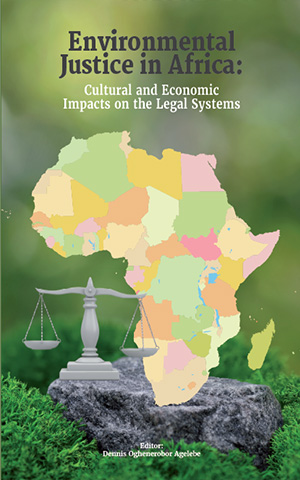Open Access

Environmental justice in Africa: Cultural and economic impacts on the legal systems
Edited by Dennis Oghenerobor Agelebe
2025
ISBN: 978-1-7764485-5-5
Pages: 405
Print version: Available
Electronic version: Free PDF available
About the publication
This book’s overarching theme is to discern the role of law in shaping environmental justice in Africa. Simultaneously, it delves into the intricate interplay of economic and cultural factors that can either facilitate or impede the pursuit of justice. Acknowledging that environmental justice transcends legal frameworks alone, the book emphasises its recognition as a social pillar integral to sustainable development. In this holistic perspective, environmental justice is positioned on equal footing with environmental protection and economic sustainability, highlighting its multifaceted nature in Africa.
Table of Contents
Acknowledgments
Preface
Contributors
Part I: Working with standard tools: Domestic law’s limited contribution to environmental justice
1 Contextual approaches to environmental justice in Africa
Dennis Agelebe
- Introduction
- Environmental justice: Origin and perspectives
- Scope of environmental justice
- Perspectives on environmental justice: Africa
- Elements of environmental justice: African context
- Access to justice
- Distributive environmental justice
- Conclusion
- Introduction
- Access to information as a principle of democracy
- The contribution of Nigeria’s freedom of information legislation to the realisation of the right of access to environmental information
- Access to environmental information in Nigeria
- Conclusion
3 Legislating environmental rights for environmental justice: The strain of interests in the Niger Delta of Nigeria
Michael Ibanga & Dennis Agelebe
- Introduction
- The concept of environmental justice
- Environmental problems of the oil-producing communities
- Evaluation of the former and current legal framework for environmental protection of oil producing communities
- Current legal framework
- Conclusion
4 Promotion of environmental justice in Nigeria: A panacea for a sustainable environment
Glory Ene
- Introduction
- Concept of environmental justice
- Impact of oil exploration activities and the struggle for environmental justice in the Niger Delta
- Environmental rights and access to environmental justice in Nigeria
- Legal/technical juridical hurdles in access to environmental justice in Nigeria
- Non-legal obstacles against access to justice in environmental matters
- Environmental justice as a panacea for environmental sustainability
- Conclusion
Part II: Working with standard legal tools: International law’s role in achieving environmental justice
5 Access to environmental justice in Zambia: A critical review of three significant cases
Pamela Towela Sambo
- Introduction
- Access to environmental justice literature review
- The basis for analysis of access to environmental justice cases in Zambia post-2011
- Analysis of the three access to environmental justice cases
- Other access to environmental justice issues for possible consideration
- Conclusion
6 The legal protection of forests in international environmental law, shortcomings and comparative analysis
Alois Aldridge Mugadza
- Introduction
- Carbon sequestration
- Deforestation
- Climate change laws relating to forest protection
- Forest governance
- The importance of environmental justice in REDD+
- Analysis
- Conclusion
7 Implementing environmental rule of law in the mining sector in Kenya: An assessment of the Cortec Mining case
Collins Odote & Susan Yara
- Introduction
- Conceptualisation of environmental rule of law as a legal concept
- Environmental rule of law, the judiciary and dispute resolution for sustainable development
- The state of environmental rule of law in Kenya 230
- Environmental rule of law, mining, and access to justice in Kenya: The Cortec Mining Case
- Key issues from the Cortec decision
- Conclusion
8 Extraterritorial litigation against multinational corporations for climate-related human rights violations: Lessons from Okpabi v Shell
Ademola Oluborode Jegede
- Introduction
- Climate change, MNCs and wrongs: Extraterritoriality in context
- Extraterritoriality and the Okpabi case
- Lessons for extraterritorial climate change litigation
- Conclusion
Part III: Seeking environmental justice through non-traditional legal tools
9 The emergence of environmental courts and tribunals in Africa: Kenya’s environment and land court as a case study
Olayinka Ojo & Dennis Agelebe
- Introduction
- Role of ECT in assuring access to justice on environmental matters
- ECT in Africa
- Environmental courts and tribunals in Kenya
- Laudable ELC decisions
- Challenges of ELC
- Conclusion
10 Multinational corporations, transnational corporate liability and environmental justice in African states: Who will bell the cat?
Chidebe Matthew Nwankwo
- Introduction
- The problem with multinational corporations under international law
- Private litigation in foreign courts as a panacea to lack of congruence in corporate accountability?
- What hope for the African litigant in the region?
- Conclusion
11 Can the African human rights system be an effective environmental justice system in Africa?
Bhavna Mahadew
- Introduction
- An overview of environmental injustice and damages caused to Africans
- The potential for success at the domestic level for environmental justice
- Can the African human rights system be an effective environmental justice system?
- Factors impeding the effectiveness of the African human rights systems to achieve greater environmental justice in Africa
- Concluding remarks
12 A pact with the devil: Can environmental mediation bring relief to communities affected by the activities of multinational companies in Africa?
Xi Yu & Solomon Ezike
- Introduction
- The emergence of environmental mediation
- Previous experience with environmental mediation
- The hybridisation of the mediation process
- Nigeria’s ADR regulatory landscape
- Applying environmental mediation to the Niger Delta
- Conclusion
